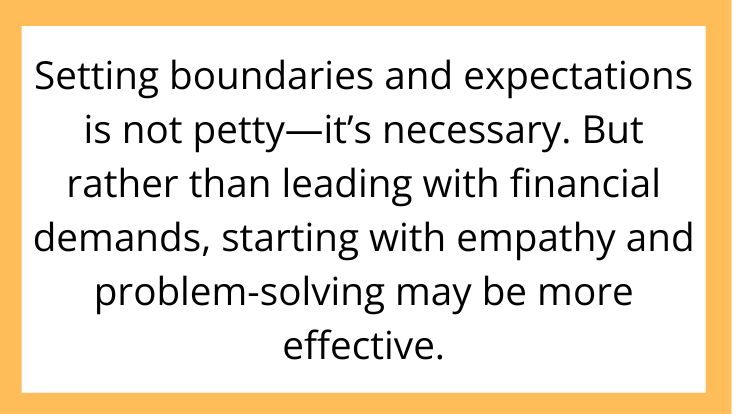AITAH for Asking My Roommate to Pay More Rent Because She Uses the Living Room as Her Office?
Living with roommates can save money and even build friendships—but it also means navigating tricky questions of fairness, boundaries, and shared space. Today’s AITAH scenario, inspired by a real Reddit post, explores what happens when one roommate starts treating common areas like their personal domain.
Let’s dive into the story and see if this renter really crossed a line.
The Backstory: An Apartment Split Down the Middle

The poster—let’s call her Emily—is a 28-year-old professional living in a two-bedroom apartment with her roommate, Jess, who is 30. When they first moved in together, the agreement was simple: each would have a private bedroom, and they’d split rent 50/50.
That arrangement worked perfectly—until Jess began working from home full-time.
Emily, on the other hand, works in an office five days a week. She comes home in the evenings hoping to relax in the living room, watch TV, or cook dinner. But every day, she walks in to find Jess on Zoom calls at the kitchen table or sprawled across the couch with her laptop, occupying the space from morning to night.
Over time, Emily noticed she was spending more time in her bedroom to avoid interrupting Jess’s workday. She felt she’d lost access to half the apartment she was paying for.
The Confrontation: A Request for Higher Rent

After months of frustration, Emily decided to talk to Jess. She calmly explained that because Jess uses the living room as a dedicated office, it effectively reduces Emily’s living space. She asked Jess if she’d be willing to pay a higher share of the rent—maybe 60/40—to reflect her increased usage.
Jess was stunned. She said that working from the living room wasn’t a luxury but a necessity. She can’t afford a separate office, and she argued that Emily was being unreasonable and petty. To Jess, the idea of paying extra rent felt like a punishment for having a remote job.
Feeling conflicted, Emily turned to the AITAH community to ask: Was she out of line for suggesting her roommate pay more rent because she’s monopolizing common areas?
The Community Reacts: Split Opinions and Strong Feelings

The post sparked a heated debate among Redditors. While many sympathized with Emily, others thought her approach was unfair.
Why Some Said Emily Wasn’t the Villain
-
Loss of Shared Space: A shared living room is supposed to be exactly that—shared. If one person uses it eight hours a day for work, it changes the dynamic for everyone.
-
Imbalance in Use: Emily was effectively confined to her bedroom during most of the day, despite paying half the rent.
-
Precedent Matters: Some commenters noted that in many roommate arrangements, if someone uses more space (like an office or storage), they typically pay more.
One top comment summed it up this way:
“You’re not punishing her for working remotely. You’re asking for fairness because you’re losing access to common areas.”
Why Others Thought Emily Overstepped
-
Remote Work Is the New Normal: Many people have no choice but to work from home. Expecting someone to pay more for using their living space as a workspace may be unrealistic.
-
Lack of Communication Early On: Jess may have assumed the living room was still available to Emily outside business hours, and no clear boundaries were set when remote work started.
-
Potential for Resentment: Changing the financial arrangement mid-lease can lead to bitterness and damage the roommate relationship.
Key Considerations: When Shared Space Becomes Private

This scenario reveals a big tension in modern renting: the line between home and work is increasingly blurry.
If you find yourself in a similar situation, here are a few questions to consider before asking for more money:
-
Is the space truly off-limits, or just occupied during work hours?
-
Was this arrangement discussed before moving in?
-
Can you agree on designated work hours or shared use times?
-
Would rearranging furniture or adding dividers help preserve shared use?
Sometimes, an honest conversation about expectations can resolve more than renegotiating the lease.
Alternative Solutions: Compromise Without Conflict

Before deciding rent must go up, Emily and Jess could try:
-
Establishing Time Blocks: Jess could work in her bedroom during certain hours so Emily has access to the living room.
-
Creating a Work Nook: A small desk in Jess’s bedroom could serve as a dedicated workspace, freeing up the common areas.
-
Noise-Cancelling Headphones and Privacy Screens: Tools that make shared spaces feel less intrusive.
-
Clear “Available” and “Do Not Disturb” signals: Simple visual cues to indicate when it’s okay to use the living room.
These steps might help avoid resentment while preserving fairness.
The Verdict: Not the Villain—But the Conversation Matters

While Emily’s frustration is completely valid, how she framed her request could set the tone for either a constructive solution or an escalating conflict.
Setting boundaries and expectations is not petty—it’s necessary. But rather than leading with financial demands, starting with empathy and problem-solving may be more effective.



